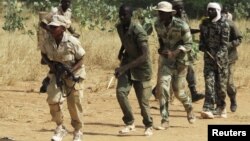DAKAR, SENEGAL —
The crisis in northern Mali could enter a new chapter this week. Malian officials are expected to meet with delegations from two of the armed groups in the north, while the U.N. Security Council plans to consider a plan for regional military intervention to Mali.
West Africa leaders continue their "carrot-and-stick" approach against the armed groups, who seized control of Mali's three northern regions in April, just days after a military coup.
Mali's foreign minister is in Ouagadougou where Malian officials are expected to meet with delegations from two of the armed groups, the ones that are Malian-led - the Islamist sect Ansar Dine and Tuareg separatist movement the MNLA.
It will be the first direct and official talks between Malian authorities and armed groups since the start of the crisis. The groups have agreed to ECOWAS-mediated negotiations to find a peaceful solution to the crisis.
But many believe that force still will be necessary against foreign fighters affiliated with al-Qaida's North Africa branch, known as al-Qaida in the Islamic Maghreb.
UN considers action
On Wednesday, the U.N. Security Council is expected to consider plans from the African Union and ECOWAS to raise a regional force of 3,300 soldiers to help the Malian army retake the north. African leaders want a U.N. intervention mandate.
U.N. Secretary General Ban Ki-moon has endorsed a one-year A.U. mission to Mali. But in his report last week, he said African leaders first need to work out additional logistics for the mission and that force should remain a "last resort."
Mali interim President Diouncounda Traore met Sunday with Niger President Mahamadou Issoufou in Niamey. Issoufou is a staunch supporter of military action. He told reporters that African countries must act quickly.
Seeking military intervention
The president said the people in northern Mali suffering abuses at the hands of these groups need to be liberated. He says if terrorists are allowed to dig in in northern Mali, they are going to attack neighboring countries. He says ECOWAS carefully considered its operational plans for Mali and has the support of the African Union. Mr. Issoufou says he is confident the U.N. Security Council will endorse the plan, regardless of the secretary-general's report.
Niger is among the West African countries that have pledged to contribute soldiers to the intervention force.
The U.N. Security Council could issue a mandate for the force before the end of the year, though regional observers say any offensive to the north is unlikely before the second half of 2013.
Malian President Traore said they will not wait that long. He said this problem poses a threat to global security. He said he does not think they will wait until September or October to act. And by "they," he says he does not mean just Mali and Niger, or just ECOWAS, or even just Africa. He said the entire world has spoken out in support of restoring Mali's territorial integrity, preserving its democracy and its secular nature. But, he said, the entire world also has said it must wipe out terrorism and organized crime.
West Africa leaders continue their "carrot-and-stick" approach against the armed groups, who seized control of Mali's three northern regions in April, just days after a military coup.
Mali's foreign minister is in Ouagadougou where Malian officials are expected to meet with delegations from two of the armed groups, the ones that are Malian-led - the Islamist sect Ansar Dine and Tuareg separatist movement the MNLA.
It will be the first direct and official talks between Malian authorities and armed groups since the start of the crisis. The groups have agreed to ECOWAS-mediated negotiations to find a peaceful solution to the crisis.
But many believe that force still will be necessary against foreign fighters affiliated with al-Qaida's North Africa branch, known as al-Qaida in the Islamic Maghreb.
UN considers action
On Wednesday, the U.N. Security Council is expected to consider plans from the African Union and ECOWAS to raise a regional force of 3,300 soldiers to help the Malian army retake the north. African leaders want a U.N. intervention mandate.
U.N. Secretary General Ban Ki-moon has endorsed a one-year A.U. mission to Mali. But in his report last week, he said African leaders first need to work out additional logistics for the mission and that force should remain a "last resort."
Mali interim President Diouncounda Traore met Sunday with Niger President Mahamadou Issoufou in Niamey. Issoufou is a staunch supporter of military action. He told reporters that African countries must act quickly.
Seeking military intervention
The president said the people in northern Mali suffering abuses at the hands of these groups need to be liberated. He says if terrorists are allowed to dig in in northern Mali, they are going to attack neighboring countries. He says ECOWAS carefully considered its operational plans for Mali and has the support of the African Union. Mr. Issoufou says he is confident the U.N. Security Council will endorse the plan, regardless of the secretary-general's report.
Niger is among the West African countries that have pledged to contribute soldiers to the intervention force.
The U.N. Security Council could issue a mandate for the force before the end of the year, though regional observers say any offensive to the north is unlikely before the second half of 2013.
Malian President Traore said they will not wait that long. He said this problem poses a threat to global security. He said he does not think they will wait until September or October to act. And by "they," he says he does not mean just Mali and Niger, or just ECOWAS, or even just Africa. He said the entire world has spoken out in support of restoring Mali's territorial integrity, preserving its democracy and its secular nature. But, he said, the entire world also has said it must wipe out terrorism and organized crime.





